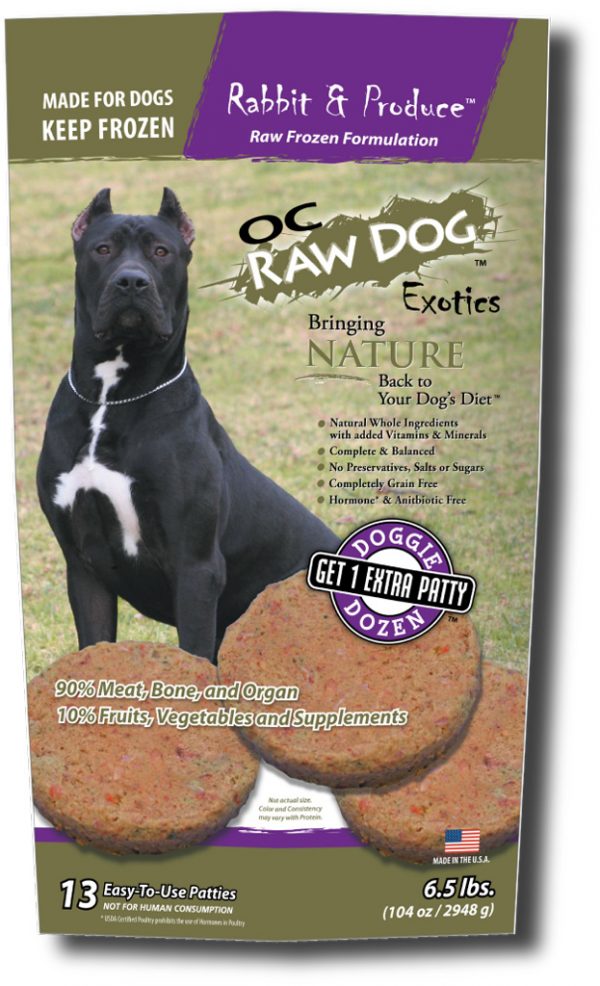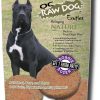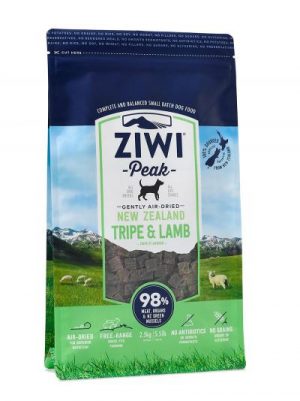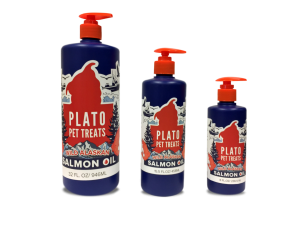Description
Crude Protein………………15%
Min Crude Fat……………..4%
Max. Crude Fiber…………1%
Max. Moisture……………..75%
DM Calcium……………….1.9%
DM Phosphorous………….2.5%
Omega 3 / Omega 6 ratio 1:3
Calcium / Phosphorus 1:1
Calorie Content (calculated; ME): 1,312.6 kcal/kg and 298 kcal 8 oz.
Safe Handling Instructions:
For maximum freshness we recommend you keep the food frozen until ready to serve. Thaw in the refrigerator, never in the microwave, once thawed the food will be good for 2-3 days in the refrigerator. This product is made from raw foods which may contain bacteria harmful to humans. We highly recommend that you store raw food separate from ready-to-eat foods and always wash your hands, bowls, and handling surfaces, like counters or cutting boards, in hot soapy water after use.
General Feeding Guideline:
We recommend 2%-3% of your dog’s body weight being fed daily based on life stage and energy requirements. For puppies and/or pregnant/lactating females we recommend 4% – 6% of body weight daily. For senior or weight conscious dogs we recommend 1.5% – 2% of body weight daily depending on the fat content of the different protein formulations.

Check out our “transitioning” graph to add OC RAW DOG to your pet’s diet

Description and benefits of the ingredients:
Rabbit Meat: Is classified as poultry. Like chicken or turkey but is extremely lean with more protein and significantly less fat. But unlike the common proteins of chicken and turkey dogs and cats who are allergic to poultry can usually digest rabbit without allergy symptoms. Other benefits of rabbit meat include the following: there is no cholesterol found in rabbit meat making it a fantastic option for dogs who have a history of cardiac disease. Rabbit meat contains fewer calories when comparing ounce per ounce of chicken, turkey, beef, and lamb making it a fantastic option for dogs needing to lose a few pounds without significantly cutting the portion size.
Carrots: Carrots are good source of Thiamine, Niacin, Vitamin B6, Folate and Manganese, and a very good source of Dietary Fiber, Vitamin A, Vitamin C, Vitamin K and Potassium. Carrots are an excellent source of antioxidant compounds, and the richest vegetable source of the pro-vitamin A carotene’s. Carrots’ antioxidant compounds help protect against cardiovascular disease and cancer and also promote good vision, especially night vision.
Apples: Apples are a great source of Vitamin A, Vitamin C and Dietary Fiber. Apples have been shown to help reduce blood cholesterol, improve bowel function, reduce risk of stroke, promote healthy lung functions due to the fiber and phytonutrients present in the apples.
Green Beans: Green Beans are an excellent source of vitamin A and vitamin C. These are both important for maintaining optimum health, and are also valuable antioxidants. Green beans offer additional antioxidants in the forms of manganese and a variety of cartenoids and flavonoids. All of these in tandem make green beans an antioxidant powerhouse, which is crucial in preventing various cancers and heart diseases. Antioxidants perform this function by seeking out and neutralizing free radicals that damage cells. These damaged cells, in turn, damage other cells in their vicinity, creating a chain reaction that negatively affects your health.
Beyond their antioxidant benefits, the high levels of calcium, vitamin K, magnesium, phosphorous and silicon all support stronger, healthier bones. Evidence is also beginning to emerge showing that green beans has anti-inflammation benefits, and may also prevent the onset of type 2 diabetes with the ability to aid in the process of sugar in the body and stabilize insulin levels. And, to boot, green beans pack in a bunch of dietary fiber into a few calories, leaving your digestive track clean and healthy.
Broccoli: A very good source of Dietary Fiber, Vitamin A, C, K, B6, Folate, Potassium and Manganese. Also a good source of added protein, Vitamin E, Thiamine, Riboflavin, Pantothenic Acid, Calcium, Iron, Magnesium, and Phosphorous and Selenium. This has been shown to fend off cancer, osteoporosis, birth defects, and heart disease. It can also boost your immunity.
Spinach: Contains Niacin and Zinc, and a very good source of Dietary Fiber, Protein, Vitamin A, Vitamin C, Vitamin E (Alpha Tocopherol), Vitamin K, Thiamine, Riboflavin, Vitamin B6, Folate, Calcium, Iron, Magnesium, Phosphorus, Potassium, Copper and Manganese.
Acorn Squash: Acorn Squash is a good source of Dietary Fiber, Vitamin A, Vitamin B6, Folate and Magnesium, and a very good source of Vitamin C, Thiamine, Potassium and Manganese. Acorn squash have been found to have anti-cancer type effects. specifically the ability to prevent cell mutations (cancer-like changes).
Beets: Beets are a good source of Vitamin C, Iron and Magnesium, and a very good source of Dietary Fiber, Folate, Potassium and Manganese. Beets are of great therapeutic value. They have properties to clean the kidneys and gall bladder.
Cod Liver Oil: This food is very low in Sodium. It is also a very good source of Vitamin A and Vitamin D. It also provides your dog with omega-3 fatty acids. These are essential for the healthy function of the brain, the heart, the joints, the digestive system and many other systems of the body. Another benefit of cod liver oil is related to its vitamin E content, which helps the body process the fatty acids, is an essential antioxidant and promotes the health of the skin and coat.
Parsley: Parsley is a good source of Protein, Vitamin E (Alpha Tocopherol), Thiamine, Riboflavin, Niacin, Vitamin B6, Pantothenic Acid, Phosphorus and Zinc, and a very good source of Dietary Fiber, Vitamin A, Vitamin C, Vitamin K, Folate, Calcium, Iron, Magnesium, Potassium, Copper and Manganese. Parsley’s volatile oils-particularly myristicin-have been shown to inhibit tumor formation in animal studies, and particularly, tumor formation in the lungs. Folic acid is also a critical nutrient for proper cell division and is therefore vitally important for cancer-prevention in two areas of the body that contain rapidly dividing cells.
Blueberries: This food is very low in Saturated Fat, Cholesterol and Sodium. It is also a good source of Dietary Fiber, and a very good source of Vitamin C, Vitamin K and Manganese. Blueberries are not only a powerful antioxidant but also have been proved to preserve vision.
Cranberries: Have several health benefits to maintain urinary tract health they contain a compound that prevents microorganisms from adhering to cells of the urinary tract. They have what researchers call “anti-adhesion” properties that can help reduce the risk of urinary tract infections. The same compound aids in the Dental Health using the same “anti-adhesion” property prevents bacteria from forming in the mouth. They might reduce the formation of harmful plaque that leads to gum disease. Cranberries aid in Heart Health by reducing bad (LDL) cholesterol levels and raise levels of good (HDL) cholesterol in the blood. They contain Anti Cancer Antioxidants that have been found to inhibit the formation of cancer cells. As well as anti-ulcer benefits from the tannins found in cranberries which can prevent the adhesion of ulcer causing bacteria in the stomach?
Olive Oil: Olive oil is rich in monounsaturated fat and antioxidants like chlorophyll, carotenoids and vitamin E scientists have identified a compound in olive oil called oleuropein which prevents the LDL cholesterol from oxidizing. It is the oxidized cholesterol that sticks to the walls of the arteries and forms plaque. A study published in the January 2005 issue of Annals of Oncology has identified oleic acid, a monounsaturated fatty acid found in olive oil, as having the ability to reduce the affect of an oncogene (a gene that will turn a host cell into a cancer cell). This particular oncogene is associated with the rapid growth of breast cancer tumors. The conclusion of the researchers was that oleic acid when combined with drug therapy encouraged the self-destruction of aggressive, treatment-resistant cancer cells thus destroying the cancer. Olive oil has been positively indicated in studies on prostate and endometrial cancers as well.
Unlike other fats, which are associated with a higher risk of colon cancer, olive oil helps protect the cells of the colon from carcinogens. A study published in the November 2003 issue of Food Chemistry Toxicology suggests that the antioxidants in olive oil reduce the amount of carcinogens formed when meat is cooked. Olive oil is also linked to lower triglyceride levels.
Calcium Carbonate: Calcium Carbonate is the true complete food grade form of solid calcium. The AAFCO requires that any dog or cat food be at minimum equal in calcium and phosphorus. Bone is not a naturally one to one ratio. This is why we add calcium carbonate to increase the calcium ratios in the food.


 Wish List
Wish List 






Reviews
There are no reviews yet.